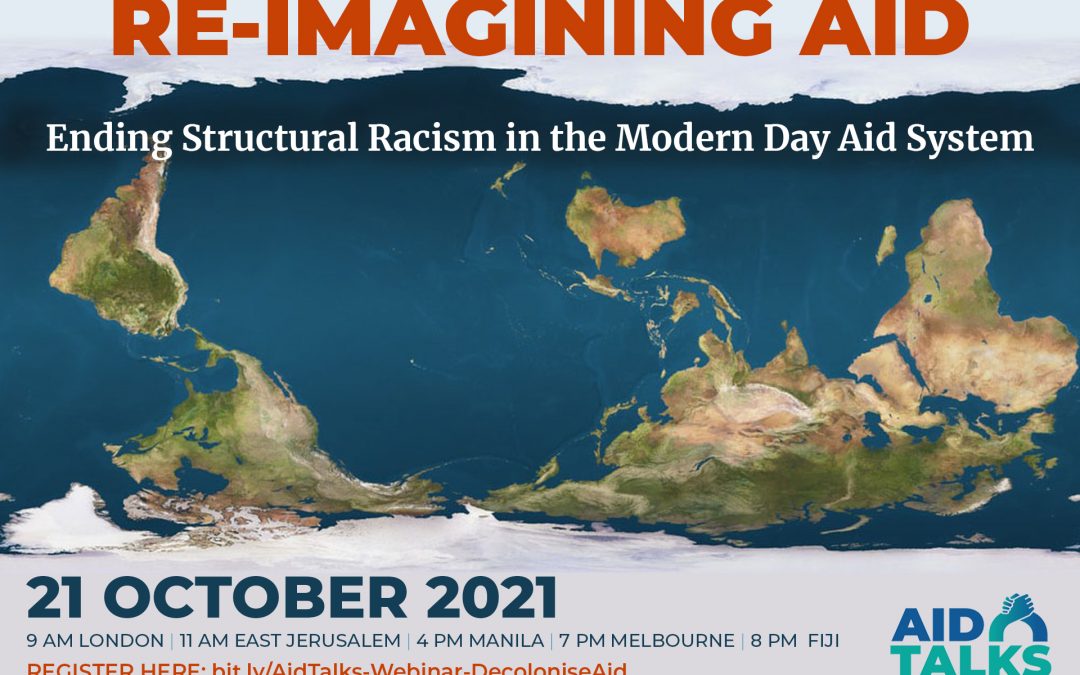Current aid and development models have long been instruments of colonialism and structural racism, perpetuating power imbalances in the global South. The persistence of these models have a profound impact on the marginalized and vulnerable peoples of the South, endangering their lives, livelihood and environment, further impeding their development.
Last October 21, 2021, Reality of Aid – Asia Pacific and Aid/Watch Australia held the fourth Aid Talks, “Re-imagining Aid: Ending Structural Racism in the Modern-Day Aid System”, providing space for conversations on the decolonisation of aid and how these manifest in the persisting development challenges the Southern peoples face today.
Uprooting colonial legacies of aid
Carol Sherman, former co-founder of Aid/Watch, kicked off the discussion by unpacking the underlying colonial roots and legacies of aid. According to her, “structural racism disadvantages people of color worldwide, and colonial practices rooted in the aid industry such as the use of European ideas to determine what development is and the creation of financial systems that enrich the few at the expense of many puts the global North at the center of making change happen and making progress dependent on their goodwill”.
Firas Jaber, co-founder of Social and Economic Policies Monitor- Al-Marsad, shares how aid is weaponized and instrumentalized for the occupation in Palestine, as it comes with policy conditionalities to sustain the status quo. The lack of democratic country ownership over development priorities, among others, has failed to address the root causes of conflict and fragility.
To decolonise aid, he suggests,
“We need to respect the sovereignty of our people. We need to agree upon the development priorities of the people, not the donors. Get more solidarity and support from the nations, individuals, like-minded progressive organisations in order to support the struggle against colonisation in Palestine and elsewhere; how to really respect human rights of the people, not to be undermined by the funders.”
Jaber invites the international community to join the Palestinian people in the Palestinian Campaign to Reject Conditional Funding, which calls for the revocation of the anti-terrorism clause of the European Union in providing financing to civil society organizations in Palestine. These conditionalities, as stated in the European Union’s General Conditions, criminalizes the fight for independence and sovereignty of the Palestinian people.
Decolonising destructive aid
The neoliberal and colonial structure of aid has heavily contributed to environmental degradation. Emeline Siale Ilolahia, Executive Director of the Pacific Islands Association of Non-Governmental Organisations (PIANGO), linked the lack of climate financing with the prioritization of donor and corporate interests over people-centered development.
When it comes to budget support, Ilolahia laments how donor countries have major influence over national governments’ priorities for development as she explains the alarming evidence wherein countries in the Pacific have decreased independent-driven projects that are locally-led. Access to climate financing remains a challenge, as conversations and requirements for these are highly technical, monopolized by members of the academe, governments, international institutions and the private sector.
Community resilience against climate change is seen as a commodity, especially by extractivist industries that exploit the South’s natural resources.
Ilolahia encourages the audience (and readers) to join PIANGO’s Pacific Blue Line campaign in calling for the ban of deep sea mining activities in the Pacific, which further harms the Pacific communities’ lives, livelihoods, cultural practices and well-being. These activities further contribute to the loss of biodiversity, marine pollution and environmental degradation. Sign the petition here.
Decolonising aid is re-imagining aid
To pursue the decolonisation of aid, actors from both the global North and the global South must work in partnership with each other to ensure that aid is promoting local interests and genuine development. Krister Holm, Regional Director of Diakonia Asia, highlights solidarity as an important way of engagement, instead of the charity approach of aid, where racism can be a hidden value.
Holm highlights how CSOs from the global North must be aware of the underlying causes and consequences of structural racism in the aid sector. In Diakonia’s context, “structural racism that exists in general in Swedish society is much caused by the colonial legacy and the fact that Swedish neoliberal economic and political decision makers identify themselves and Sweden to belong to the Eurocentric and transatlantic imperialistic bloc.” Neoliberal and donor-driven “development” projects further disenfranchise the marginalized, especially people of color and Indigenous Peoples.
Holm cited concrete ways by which Diakonia has been taking steps toward decolonisation of aid – for instance, in upholding and operationalizing development effectiveness principles and implementing programs that are truly led by affected communities or sectors. Providing spaces for further conversation on the decolonisation of aid must also be undertaken, ensuring the participation of the peoples of the global South. Diakonia has recently organized the webinar, “Redefining Power in Partnerships – Time to decolonize civil society aid!”, which also opened avenues for collaboration among members of civil society to re-imagine aid.
Rodolfo Lahoy Jr. of IBON International wrapped up the discussion by reiterating how prevailing economic structures, ideologies, and unequal racist power relations manifest in the current aid system.
He added, “We need to address these barriers to really advance development owned by the people and advance their rights.”
The fourth Aid Talks calls attention to the imperative of critically examining the underlying power relations in aid and development cooperation, and the crucial role of CSOs in collectively taking the steps towards a reimagined aid system – one that rejects colonial domination and racism – towards a rights-based, people-centered development.
You can watch the replay here.

